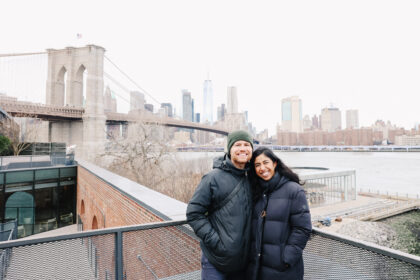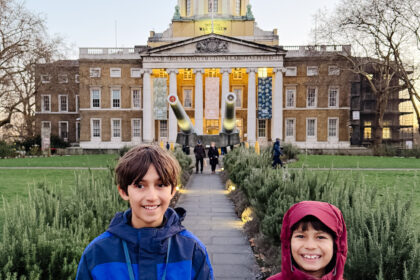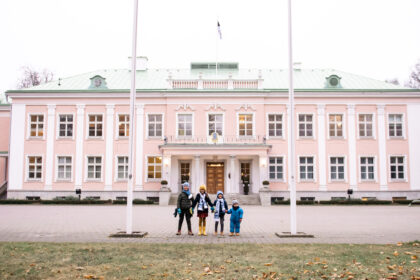Right now, I’m pregnant with my 6th child. I never thought I’d have this many children! In fact, it never even crossed my mind as a child. I have one sister, and always assumed I’d have 2 kids of my own. It’s funny how our own experience often informs our visions of the future.
But then when I met my now-husband, we decided we wanted a bigger family. We knew we wanted at least 4 kids, but more likely 6. It seemed crazy, and we left things open after each child. But we kept feeling we wanted one more – until now. I was honestly thrilled when I became pregnant this time and finally felt “done.”
During my entire childhood, college, and very early married years, I was what would often be considered “pro-life.” I thought abortion should be an option when “choice” was removed, not realizing the many intermediate aspects of true informed consent and choice. It wasn’t until I began conceiving, gestating, birthing, and parenting myself that I began to learn more and better understand others’ experiences. It wasn’t until then that I started to look into data informing what actually protects both babies AND their birthing people. I was shocked to find that what I’d always assumed was false.
It completely changed my view of what should be safe, legal, and accessible. It changed my view of what we should be doing to protect whole humans through their whole lives (healthcare, education, gun control, police safety, antiracism and inclusion efforts in schools, and lots more, but that’s a start).
And yes, it changed my view of abortion. Below are some reasons why.
To be clear – Roe v. Wade is still in effect. Abortion is still legal across the country. Nothing has changed yet. And it’s exactly because it has not yet been decided but clearly hangs in the balance that now is the time to speak out and advocate. I hope you’ll join me.

Anti-Abortion Legislation Doesn’t Work
First and foremost, anti-abortion legislation DOES NOT WORK. It DOES NOT LOWER THE RATES OF ABORTIONS. What it does do is increase harm to women and birthing people.
It is legislation that both fails in its intended purpose and also increase harm. It is ineffective and unsafe. PERIOD. FULL STOP.
Data shows that banning abortions does not actually decrease the number of abortions. In fact, it indicates that banning abortion in the US would, “lead to a 21% increase in the number of pregnancy-related deaths overall and a 33% increase among Black women, simply because staying pregnant is more dangerous than having an abortion. Increased deaths due to unsafe abortions or attempted abortions would be in addition to these estimates.” (Source)
Nearly half of all abortions around the world are performed in unsafe conditions, leading to many preventable pregnancy-related deaths. Anti-abortion legislation does not decrease the overall number of abortions. Instead, it simply increases the number of abortions performed in unsafe conditions – which is more likely for those from marginalized communities who lack the resources to travel to a place that can legally perform a safe abortion.
Choice Isn’t Choice Without Knowledge or Access
For a long time, I thought the choice for an abortion should only be provided when someone with a uterus wasn’t provided a “choice” in getting pregnant – in cases of rape, incest, etc. I knew it wasn’t fair to inflict further pain and trauma on someone who had already endured so much, and had no choice in what had happened to them.
But I eventually figured out that choice is dependent on knowledge. And knowledge and education are hugely lacking in many respects in the US. Sex ed is often not the norm, or is hugely restricted in terms of how it is taught. Financial choice is certainly not equitable, nor is the choice for maternal care. School and career repercussions are often not evident. Informed consent requires informed choice, which is too often lacking.
Choice of Intimacy
As I mentioned above, I used to think that if you chose to have sex, you were also choosing the risk of children. Until I finally realized that sex isn’t just for having children.
The choice to be intimate is not a choice to gestate, birth, and raise children. Men/non-birthing people get to make that choice regularly and with significantly less risk. And yet people with uteruses aren’t afforded that same privilege. They’re told that the choice is either to engage in sex – a normal and natural part of many relationships – while taking the risk of pregnancy, gestation, and childbirth, or to make the choice to avoid sex altogether. That is not a reasonable or healthy option for most adults, regardless of marital status.
Too often, young girls in a shroud of purity culture and patriarchy are taught that sex is only for the purpose of childbearing. And yet young men are conditioned to desire and seek sex for the sake of pleasure. Then when that happens, the girls bear the brunt of the shame for engaging in sex – they think that since they took the risk and it’s only supposed to be for childbearing, they must bear the consequences. While boys and men tend to go on their merry way thinking it was just for their pleasure, anyway, and thus feel no shame or responsibility.
Intimacy is a normal and natural part of adult life for ALL sexes and genders. It’s not bad. And it’s not just for the purpose of pregnancy.
Cost & Lack of Access to Preventative Measures
If we want to prevent abortions, the very clear first step is to prevent unintended pregnancies. And yet in the US, we’re not doing that. Sexual education is often not taught or is restricted to abstinence-only education, and contraception can be either costly, difficult to access, or both. If we truly care about preventing abortions, these are the things we MUST provide in order to make that happen. They are the things that are proven to be effective.
Not to mention the fact that the measures that are readily available are typically things available to MEN, but ones they often refuse to use – like condoms. Or regular vasectomies (which are, by the way, safe, include MUCH less discomfort than a 9-month pregnancy and childbirth, and totally reversible). Or pulling out. But these are things that those with penises often recoil against.
Pregnancy & Childbirth Risk
Pregnancy and childbirth is not without cost or risk. Maternal care is wildly expensive – which is why many women simply don’t receive it. The US has an extremely high maternal mortality rate compared to other high income countries (more info here and here), and the rates are rising year over year. This is largely due to lack of care (either due to cost or availability) both during pregnancy and postpartum. That is, the US has resources similar to those of other countries but refuses to use them to protect women’s health. And now the option to opt out of that significant risk is in question.
And guess who is most impacted? You guessed it – women from marginalized communities. This table shows info on increasing maternal mortality rates, and who is bearing the brunt of it. While even the maternal mortality rate (deaths per 100,000) has increased 28% for Non-Hispanic white women from 2018 to 2020, it’s increased a whopping 48% for Non-Hispanic Black women and over 54% for Hispanic women. Tell me that’s equitable.
Healthcare is accessible to the wealthy. Safe abortion will still be accessible to the wealthy. What overturning Roe v. Wade would do is make it inaccessible to those who are from marginalized communities and put them at much greater risk – during pregnancy, during childbirth, during the rest of their lives as they struggle to either care for an unplanned child or deal with past trauma, when resources aren’t provided for any of those things. It’s poor women, Black and brown women, immigrant women, etc. who will be most impacted.
Cost of Healthcare & Childcare
Cost of healthcare ties directly into cost of childcare. We are a country that requires ZERO paid parental leave, unlike virtually every other country. The US lags significantly behind most other high-income countries in terms of family-friendly policies. The US also trails other wealthy countries in childcare expenditures and in terms of childcare cost and accessibility, as well as in terms of postpartum care and mental healthcare.
Children are wonderful. They’re also a burden, and that burden falls disproportionately on birthing people. It also falls disproportionately on poor people who are unable to work from home, may not have childcare resources, or lack generational wealth and support in raising children.
Varying Religious Beliefs
So much of anti-abortion legislation is founded on some seemingly superior view of morality. To me, though, it’s not a moral issue at all where the baby is concerned (though it is for the birthing person – it’s completely immoral to force someone into a situation that is proven to be physically, emotionally, mentally, and financially risky due to normal and often responsible behaviors, without any way to opt out). And that’s because to me, a group of cells just coming together is not yet a human.
Yes, there’s potential. But there’s also “potential” in sperm. Does this mean that sex for those with penises should be restricted to ONLY be used for the purpose of creating life. Should ejaculation in all forms be regulated because there is “potential” in the sperm? A female orgasm doesn’t have the potential for life; should only female orgasms be allowed outside of the purpose of life creation? At what point does the “potential” for life come into play?
Surely there are far too many variations of beliefs on this to regulate – especially when so many are religiously informed. We’re a country that believes in a separation of church and state – we should not be regulating others’ beliefs on the right to life when that person is not yet a sentient, independent being.
Even as a deeply religious and spiritual person, I’m not certain on when I believe “life” truly begins. There’s physical life, but within my faith, we believe true mortal life is dependent on the marrying of the physical body with a spirit. In fact, Jesus’s death was marked by His spirit leaving his physical body.
So when does that spirit enter the body? At conception? Is it present before? Does it enter when the physical body exits its gestational home? Or sometime in between? My personal faith has no doctrine supporting an immutable definition of when this happens. I know those who have felt a connection to their baby immediately upon conception. I personally never have until giving birth or even later. It’s possible it varies by the person gestating or even based on the particular spirit. Regardless, we in no way can or should define this belief for someone else.
Individual Scenarios
There are just countless individual scenarios where abortions might be necessary or reasonable but would be restricted if Roe v. Wade is overturned. Too many to name.
There are women I personally know who have needed a D&C early in pregnancy because of a health complication for mom or baby, and an abortion allowed them to stay healthy and go on to have a future healthy pregnancy. There are those who do not have the support of their spouses in a pregnancy, and the choice is to either have a safe abortion or to self-abort (or ask the help of an untrained community member). There are those who know their baby will not live outside of the womb and believe the more humane and safer option for the child and themselves s to abort instead of waiting through the rest of a complicated pregnancy. There are those who know complications are coming and are at risk of going into sepsis, but since the mother’s life is not quite yet at risk, an abortion is not allowed – even though it’s much riskier to wait until that happens. Poor people, disabled people, immigrants who can’t travel to other parts of the country to access the healthcare they need.
And I think of myself – a mom of soon-to-be 6 kids. I’ve had easy pregnancies and I’m grateful we’ve been able to choose every one of our kids. And I’m very certain we are done. I could not handle another child after this, mentally or physically or emotionally. I would not be able to care for my other children how I want.
But I’m only 37! While I’m no spring chick anymore, I’m still well within fertile years. My mom easily got pregnant with and gave birth to my sister at nearly 40. While we will take every precaution, and while the chances of pregnancy under those circumstances is slim, it’s not zero. It’s not fair to me, to my husband, or to my other children for someone else to make that surely impossible decision for me should it ever arise. I should get to decide on my own family, health risks, financial burdens, and more.
When Data and Humanity Coincide
There are many hard decisions in life when what we feel is morally right goes against data. We’re faced with many complex choices as humans. But to me, this just isn’t one of them.
Those who are “pro-choice” don’t want more abortions. In fact, we’re absolutely thrilled when abortion rates decrease! Because it means that BOTH babies and birthing people are safer. Because we know that what actually is proven to reduce those rates (hint: it’s not reducing access) ALSO keeps birthing people – most often women – healthier, too. It keeps them alive. It keeps them happier. It helps them improve themselves, their families, and their communities.
Let’s not prioritize a superficial moral high ground over actual data on what improves outcomes for both babies AND the people gestating them.











thank you for speaking out on this – I have followed you for a long time for many other topics, but this demonstrates so much strength to put this into words describing your change in viewpoint and the reasons why. so many hugs to you.
Thank you. This is excellent.
Very well written. Thank you for sharing your thoughts.